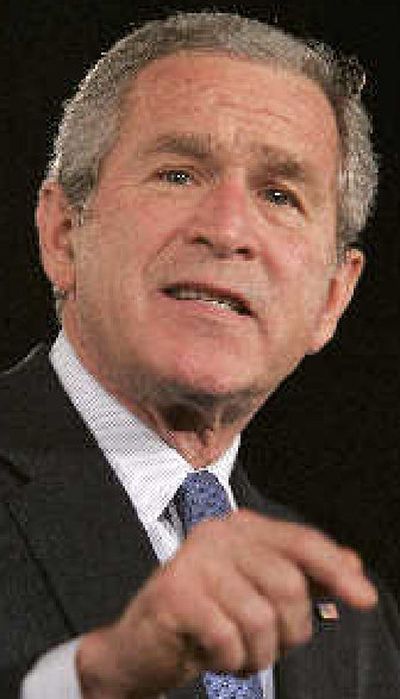President takes off his gloves

TOBYHANNA, Pa. – President Bush on Friday offered his most vigorous defense yet of his decision to invade Iraq, rejecting as “false” and “baseless” accusations that his administration twisted intelligence to support its case for war.
The attempts by Democratic lawmakers and others to rewrite history are demoralizing U.S. troops and encouraging their radical Islamic foes, Bush said.
Bush’s assertions were in response to renewed questions about how the administration used intelligence in making its case for war. The revived interest follows the indictment of I. Lewis “Scooter” Libby, former chief of staff to Vice President Dick Cheney, on perjury charges. That case involved the leak of the identity of a CIA officer married to a critic of Bush’s use of Iraq intelligence.
Meanwhile, the number of American servicemen and women killed in Iraq has reached 2,050.
Standing before a poster reading “Strategy for Victory,” Bush spoke at the Tobyhanna Army Depot of the dangers of violent Islamic radicalism and what he asserted has been progress in the fight to defeat terrorism and build democracy in Iraq and elsewhere.
He also responded to critics’ accusations that his administration misused intelligence to hype the threat posed by former Iraqi dictator Saddam Hussein. No evidence has been found to substantiate the administration’s claims that Iraq was hiding chemical and biological weapons, secretly pursuing nuclear ones and might give them to al-Qaida or other terrorist organizations.
“The stakes in the global war on terror are too high and the national interest is too important for politicians to throw out false charges,” Bush declared. “These baseless attacks send the wrong signal to our troops and to an enemy that is questioning America’s will.
“As our troops fight a ruthless enemy determined to destroy our way of life, they deserve to know that their elected leaders who voted to send them to war continue to stand behind them,” he continued to applause and cheers.
Senior Democrats accused Bush of misusing Veterans Day for partisan politics, and they urged him to cooperate with a Senate probe into the handling of prewar intelligence on Iraq.
“Attacking those patriotic Americans who have raised serious questions about the case the Bush administration made to take our country to war does not provide us a plan for success that will bring our troops home,” said Senate Minority Leader Harry Reid, D-Nev.
“I wish President Bush knew better than to dishonor America’s veterans by playing the politics of fear and smear on Veterans Day,” said Sen. John Kerry, D-Mass. “This administration misled a nation into war by cherry-picking intelligence and stretching the truth beyond recognition.”
Bush said that many of his Democratic critics had access to the same prewar intelligence that he’d read. And, he noted, those critics were among the more than 100 Democrats in the House of Representatives and the Senate who voted for a resolution authorizing the use of force against Saddam.
“While it’s perfectly legitimate to criticize my decisions or the conduct of the war, it is deeply irresponsible to rewrite the history of how the war began,” Bush said.
Bush and his aides contended that Saddam was concealing nuclear, biological and chemical warfare programs in violation of a United Nations ban.
Saddam, they said, was in league with al-Qaida and had to be toppled before he could give banned weapons to terrorists.
The administration relied in part on a seriously flawed, hastily written October 2002 U.S. intelligence assessment, which concluded that Saddam was hiding an illegal nuclear weapons program and stockpiles of biological and chemical weapons.
But the administration’s assertions about Iraq’s ties to al-Qaida weren’t supported by U.S. intelligence agencies. In fact, prewar CIA reports found no operational cooperation between Iraq and al-Qaida, a conclusion also reached by the independent 9/11 commission. Moreover, CIA reports discounted the possibility that Saddam would turn chemical or biological weapons over to terrorists.
The White House also relied on bogus and exaggerated information from Iraqi defectors supplied by the Iraqi National Congress, a former exile group with close ties to Cheney and senior Pentagon hawks, even after U.S. intelligence officials had rejected their claims.
In his speech, Bush asserted that a bipartisan Senate inquiry into the prewar U.S. intelligence assessment on Iraq’s banned weapons had “found no evidence” that administration officials pressured intelligence analysts to support their case for war.
But senior Democrats on the Senate Intelligence Committee said in comments accompanying the panel’s July 2004 report that analysts had worked “in a highly pressurized climate.”
The 1,800 people who attended Bush’s speech were largely employees of the Tobyhanna Army Depot and their families, said depot spokesman Kevin Toolan. The rest were veterans and invited guests.